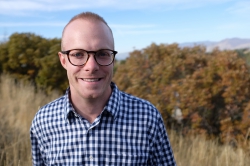An Innovative Learning Process
PROVO, Utah – Jul 06, 2021 – After drinking a soda on his way home from campus, BYU Marriott School of Business alum Ryan Smith was surprised to find his student apartment did not have any way to recycle his empty can. After reading a BYU survey that showed the majority of students also wanted to recycle, the 2016 strategy alum started thinking of the idea for Recyclops, a gig economy recycling company. Running his own business while taking classes allowed Smith to learn much more from the strategy program. Although Recyclops almost failed, applying the principles he learned in the classroom to his work helped Smith produce a multimillion-dollar company.
Growing up, Smith was a habitual recycler who did not realize the benefits and ease of recycling until he no longer had access to easy ways to recycle. Founding Recyclops was Smith’s way of fixing a problem he saw in his life and doing the right thing for the environment. His company relies on private drivers (similar to Uber drivers) to go door to door and pick up recycling for customers. Recyclops creates recycling programs for communities that do not have one, or supplements insufficient programs that already exist.
Smith had the Recyclops idea for a couple of years before he finally got the courage to start the business after doing an internship in 2013 for Baby.com, a startup company in Brazil. During his internship, Smith says, “I saw these founders who were just regular, smart human beings. I thought, I’m a regular, smart human being, and if these founders could go build a business, why couldn’t I?” After that experience, Smith found the motivation to start Reyclops by picking up recycling around Utah County using a truck he bought from BYU surplus.
The beginning of Recyclops coincided with Smith’s admittance to BYU Marriott. Learning entrepreneurship principles through the Rollins Center for Entrepreneurship and Technology, the Crocker Fellowship, the Social Venture Academy, and the Entrepreneurship Club, along with his experiences in the classes of the strategy program, allowed Smith to connect his education to his company. “I believe school is much more fun and useful when you can immediately apply the lessons you learn to your actual business,” Smith shares. “I was able to get so much more out of my degree because I’m an entrepreneur and could apply lessons to something that I was passionate about in my real life.”
After graduating with his strategy degree, Smith continued to develop Recyclops full-time. As with any startup, challenges were no stranger to Smith and his business. In 2018, a recycling policy shift upended Smith’s business model when China stopped accepting some plastics from the United States. Selling recyclable materials to China provided most of Recyclops’ revenue, so the policy shift resulted in the company losing eighty percent of its profits. Smith could still sell nonplastic materials to China, and he doubled-down on those products, but plastic had been the big money maker.
Smith was on the verge of personal bankruptcy, and then the market began to recover as other countries, such as India and Malaysia, started accepting plastics from the U.S. At the same time, Smith used the incident as motivation to update his business model in order to be as efficient and profitable as possible.
Cutting costs allowed Recyclops to be profitable even if industry trends temporarily hurt income. To cut costs, Smith stopped doing all of the work himself and started hiring private drivers to pick up recycling in their own cars. He also switched from using bins to bags, a move that decreased the amount of contamination in the collected recyclables. That decision allowed him to sell more materials and keep his company on the proper side of profit margins. Switching to a gig economy model also enabled Smith to sell directly to consumers, a move that resulted in rapid growth as Recyclops was implemented into more markets.
The updates to Smith's business model allowed him to come back from the brink of failure and thrive. Recyclops is currently in forty states across the country and attracts millions of dollars in investments, with the most recent being a three-million dollar investment headed up by the Clorox Company, which produces a variety of consumer products. Now that his company is succeeding, Smith has turned his attention back to BYU Marriott where his journey began. He frequently gives guest lectures for various classes and programs, and Recyclops hires BYU Marriott interns every semester. “Our team has awesome students who come in, make an impact, and help Recyclops while we help them,” Smith says.
The decision to return to BYU Marriott to help current students was driven out of gratitude. Smith says BYU Marriott enabled him to succeed and is a big part of why Recyclops is where it is today. “I received so much help from many different people when I was a student at BYU Marriott, so I feel an obligation to give back,” he says. Smith looks forward to continuing a close relationship with BYU Marriott as he furthers his recycling goals.
Media Contact: Chad Little (801) 422-1512
Writer: Mike Miller




